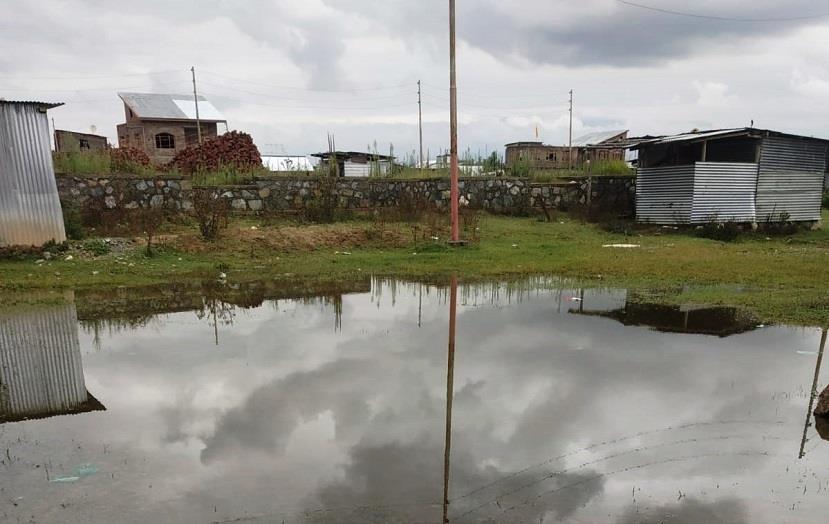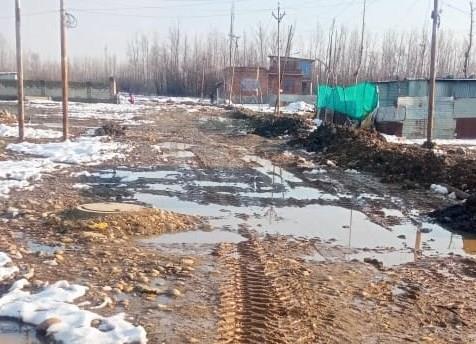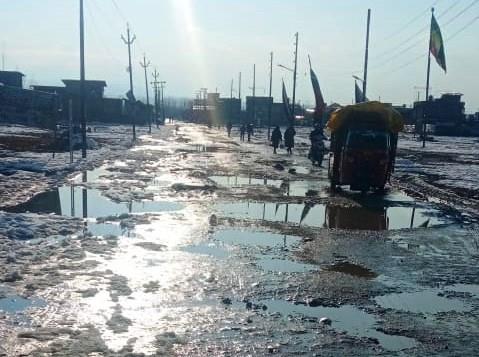(MENAFN- Kashmir Observer)

Troubled water of Rakhe-e-Arth
By Syed Burhan
Srinagar: Even as his red-shot eyes make him look livid, Mushtaq Bala comes across as a feisty man in his forties.
But his fiery yet fruitless campaign for his community welfare has aged him beyond his years.
Days before snow would fall as“sorrow” over his community confined to Srinagar's erstwhile flood channel, he took his tribe to city's press enclave to campaign for basic rights.
The year-ending protest hardly helped his case.
“We were cleaning agents of the world's most picturesque lake,” Mushtaq, taking a watchful walk on the slippery roads of his colony, says.
“But see,” he points his index finger at the shabby state of his community,“how we've been reduced to mere slum dwellers now.”

Snow-flooded road of the colony.
His tribe was driven out of the Dal Lake decades back and housed in the wetland. The shift proved proverbial for them — out of the frying pan into the fire.
In that zone they gradually lost their identity and grappled with the inadequate facilities for years. And while they await the official intervention, their colony allegedly became a“piece of cake”.
Fear of losing land after losing waters made them struggle-hardened campaigners.
But when the recent dissent demonstration ended on a disappointed note, the subsequent snow drenched their dwellings.
“This snowfall has turned our residential colony into a flood land making it unfit and dangerous for living,” Mushtaq, head of the Co-ordination Committee Rakh-e-Arth Bemina, lamented.“Sorrows often come in battalions for us.”
Mushtaq Bala
This urban sob-story started in 2007, when the Ghulam Nabi Azad government announced to relocate Dal dwellers and rehabilitate them at Rakh-e-Arth. The step was supposedly taken to preserve the water body battling pollution and pathos.
The colony was believed to be developed on modern lines with all facilities like hospitals, schools and other amenities.
But lack of these essential services is causing immense hardships to over 1100 households. Mushtaq being their headman says his community is slowly fading in an atmosphere of apathy.
“Hospital and school buildings are under construction for past 4 years here,” he said.“We don't even have transport facilities available to attend any emergency situation here.”
The colony even lacks ration stores forcing families to ferry their monthly-stock of staple food on load-carriers. It adds to their survival costs.
“At the end of the day it's about respecting human lives,” Mushtaq said.
“Why should our children be denied normal upbringing? We were promised a better life for our kids. We happily left behind our traditional homes for the assured life here. But see our condition today! We were better off as Hanjis in Dal. At least, we weren't dying every day in this pathetic colony lacking life support.”

The road in bad shape.
As he speaks, some residents struggle their way in and out of the place due to water-logged paths. The winter has escalated the already existing drainage problem of the colony.
“We've been held hostage here,” Mushtaq continued to give voice to his community's collective anguish.“There's nothing here in the name of living.”
Besides drainage problem, the bad road is making mobility difficult for the inmates.
“We find it difficult to ferry patients to the hospitals during this ongoing Covid health emergency,” Mushtaq said.
“Recently, a man breathed his last in our locality. Joining his funeral was the most difficult thing. All this makes us pity ourselves. They took us from pristine waters to leave us die in these murky waters here.”
MENAFN14012022000215011059ID1103540656
Legal Disclaimer:
MENAFN provides the information “as is” without warranty of any kind. We do not accept any responsibility or liability for the accuracy, content, images, videos, licenses, completeness, legality, or reliability of the information contained in this article. If you have any complaints or copyright issues related to this article, kindly contact the provider above.